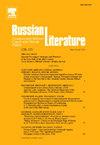对俄罗斯/苏联影响的焦虑
IF 0.3
3区 文学
0 LITERATURE, SLAVIC
引用次数: 0
摘要
这篇对四本书的评论描述了最近的斯拉夫学术如何扰乱了世界体系的讨论,这种讨论将巴黎、伦敦和纽约置于中心位置,而将包括莫斯科在内的其他地方置于边缘。可以说,除了与西方国家相关的经济利益之外,意识形态利益可能是一个激励因素。因此,这四本书提供了我们如何重新定位世界体系和世界文学中心-边缘关系的学术讨论的例子。本文章由计算机程序翻译,如有差异,请以英文原文为准。
The Anxiety of a Russian/Soviet Influence
This review of four books describes how recent Slavic scholarship disrupts the world-system discussion that places Paris, London, and New York at the center and relegates the rest, including Moscow, to the periphery. Arguably, ideological profits might be a motivating factor, beyond the economic profits associated with Western nations. As a result, the four books offer examples of how we might reorient the scholarly discussions of world-systems and the center-periphery relationships of a world literature.
求助全文
通过发布文献求助,成功后即可免费获取论文全文。
去求助
来源期刊

RUSSIAN LITERATURE
LITERATURE, SLAVIC-
CiteScore
0.60
自引率
0.00%
发文量
50
期刊介绍:
Russian Literature combines issues devoted to special topics of Russian literature with contributions on related subjects in Croatian, Serbian, Czech, Slovak and Polish literatures. Moreover, several issues each year contain articles on heterogeneous subjects concerning Russian Literature. All methods and viewpoints are welcomed, provided they contribute something new, original or challenging to our understanding of Russian and other Slavic literatures. Russian Literature regularly publishes special issues devoted to: • the historical avant-garde in Russian literature and in the other Slavic literatures • the development of descriptive and theoretical poetics in Russian studies and in studies of other Slavic fields.
 求助内容:
求助内容: 应助结果提醒方式:
应助结果提醒方式:


